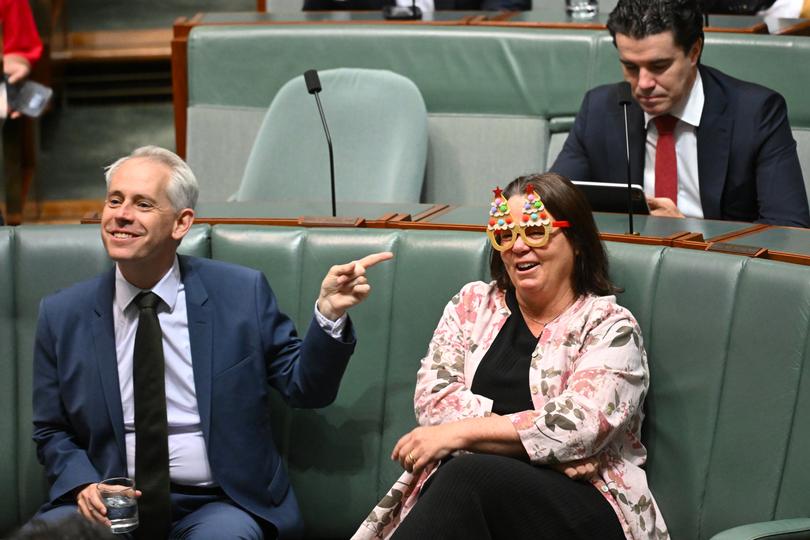ELLEN RANSLEY: Federal Parliament’s frantic finish over, now Albanese has a tough summer to turn things around
ELLEN RANSLEY: The PM took a metaphorical bow on Friday morning after defeating his legislative logjam at the 11th hour. But all the major players are already looking ahead to the 2025 poll.

In what could well be his last rev-up before the election, Anthony Albanese began the week by assuring his caucus he’d leave “nothing on the field” to make sure Labor holds on to majority government after the next election.
It was also a taste of what was to come in a frenetic and chaotic week in Canberra. After two and a half years of legislative go-slow, Albanese sprinted to cement key tranches of his first-term legacy, securing deals with different elements of the Parliament to ram through 45 Bills in the final days of the sitting year – and potentially the term.
“I don’t think is quite the record, but it’s certainly right up there with, you know, getting important legislation through and getting the job done,” Finance Minister Katy Gallagher said on Friday.
Sign up to The Nightly's newsletters.
Get the first look at the digital newspaper, curated daily stories and breaking headlines delivered to your inbox.
By continuing you agree to our Terms and Privacy Policy.Labor’s political opponents were incredulous when they received the guillotine motion late on Wednesday, alerting Senators the Government wanted to gag debate and vote immediately on 31 pieces of legislation in a single day.
Behind closed doors, Labor rallied to clinch separate deals with the Coalition and the crossbench to pull it off.
Is it democratic? Ministers were asked, to which they decried that’s just “how things go” in the final few sitting days.
But independent senator Jacqui Lambie led the charge arguing otherwise. It’s not conducive to good policy, she proclaimed.
“This Government likes to pack a lot of legislation together to avoid scrutiny,” she charged in a fiery spray on Thursday.
“These aren’t small Bills, they aren’t tweaks to the legislation that you can call non-controversial. They are big and they are massive.”
But in the end, Albanese for the most part got his big and massive way, and Labor is banking on most Australians not looking too closely at the parliamentary process - or lack thereof.
Among his crowning achievements from the week: a contentious world-first ban on children using social media, the draconian deportation powers for non-citizens, an overhaul of the Reserve Bank, and new housing measures.
He took a metaphorical bow on Friday morning, and gave a reminder that “the real value of what happens in here is the difference that it makes to people’s lives out there”.
“My government has always been focused on making Australians lives better. We know that we have more work to do but we are making progress. We understand the pressure that people are under as a result the global inflation surge,” a triumphant PM told reporters.
“But the action that my government has taken ... is making a positive difference.
“The number one priority of my government is to continue providing support. My message is we have your back.”
And now the decks are clear for him to ramp up that message to voters ahead of the next election, whenever that may be.
While he has until May, this week helped him cement Labor’s re-election pitch as the party that delivers cost-of-living relief - just take the wage rise for childcare workers, HECS indexation changes and reforms to help renters become first-home buyers - all legislated in the past few days.
But, some things did get left on the proverbial field. A controversial mis- and disinformation Bill was scrapped. Gambling reforms were put into the too-hard basket and kicked further into the long grass.
For all Labor’s horse-trading success this week, long-awaited electoral reforms which were close to passing with Coalition support fell apart at the eleventh hour. Albanese overrode a deal between Environment Minister Tanya Plibersek and the Greens on the EPA which derailed chances of passing the second (and consequently the third) tranche of nature positive reforms this side of the election.
Production tax credits failed to garner Coalition support and remain before the Senate. A bid to lift taxes on superannuation accounts larger than $3 million remains friendless without support from either the Coalition or the Greens.
By all public-facing accounts, it’s Labor intention to return to Canberra for the two weeks in February to at least try and deal with some of those. Political tactics could help make some of the leftovers key election issues.
But that will all depend on how the summer plays out. The quieter months have been kinder to Albanese than it was his predecessor, although this summer could be tougher.
With Albanese and Labor floundering in the polls and broad expectations he’s heading for a hung parliament, the PM ramped up caucus this week, telling them to enjoy a quick break and then get back out on the hustings to try and turn things around.

They’ve been told to talk up all the party has done since coming to power, offer a taste of what’s to come in a second term, stress the importance of voting for Labor in the Senate, and warn of the risk of a Dutton Government.
Peter Dutton, meanwhile, will use the summer to try and capitalise on Labor’s poor polling. Their campaigning will be built around a simple question - are you better off under Labor than you were three years ago?
Energy will shape up to be a major theme of the election, and the Coalition are set to release the long-awaited nuclear power policy within the next fortnight. More policy announcements are set to start rolling out in January.
The Coalition will also try to convince voters they can’t risk a Labor-Greens coalition - which is not out of the realm of possibility if Albanese were to lose his narrow majority.
And then there’s the Greens. Thorn in Albanese’s side they may be, they can’t be underestimated. A fear of electoral backlash finally got them to wave through Labor’s housing Bills this week without any of their demands met.
But they were given a $500m social housing electrification sweetener and assurances no public money would be spent on coal and gas projects under the Future Made legislation in exchange for their support on dozens of Bills this week.
Adam Bandt said his party “negotiated and pushed hard” and would now turn its attention to the election.
“We’ve pushed us as hard as we can, got what we could, and now for us, the attention turns, I guess, to the election, but keeping Peter Dutton out and taking some of these issues like the housing and climate crisis to what may well be a minority Parliament the next election,” he said on Friday.
As for all the speculation about when the election might be, there are a number of dates being thrown around the corridors of Parliament House.
A pre-election budget is scheduled for March, but after new independent modelling released this week projected the Budget’s deficit would hit $33.5 billion this financial year - worse than Treasury’s forecast back in May of $28.3 billion - there’s low expectations that will come to fruition.
Especially given a key cornerstone of Albanese’s messaging of late has been Labor’s heroic turnaround of Liberal deficits into two consecutive surpluses. Having Jim Chalmers stand up before Parliament and present a budget in the red risks undermining all the hard work done since 2022 to present Labor as strong economic managers.
He will hand down his mid-year economic and fiscal outlook, expected to be sometime before Christmas. Having previously played down the prospect of a spend-athon, there will be some money carved out for some pre-election promises.
Given Australians have been warned of heatwaves all summer long, minister Jenny McAllister didn’t entirely rule out more energy Bill relief to keep people cool this summer.
All sides of politics know that Australians are still feeling the pinch. Christmas is set to be tough for many families again this year, and those with mortgages are set to struggle for a while yet.
Electorally, Labor would have liked an interest rate cut to have come before the election, but Reserve Bank governor Michele Bullock has been rather emphatic that won’t happen until sticky inflation gets brought under control.
She has cautioned that while temporary cost-of-living policies like power bill relief helps push down headline inflation, it doesn’t help lower underlying inflation which the RBA factors into rates decisions.
ANZ on Friday became the third of the Big Four banks to push back their predictions and deliver a reality check to borrowers. Only the Commonwealth Bank are left predicting a rate cut in February.
Politicians know they’ll hear stories of struggle as they campaign over summer, while voters put the Government’s track record this term under the microscope.
If Labor is to convince those people life will only be better under them, Albanese really does need to leave nothing on the field - and this week’s Senate tactics won’t cut it out in the real world.

